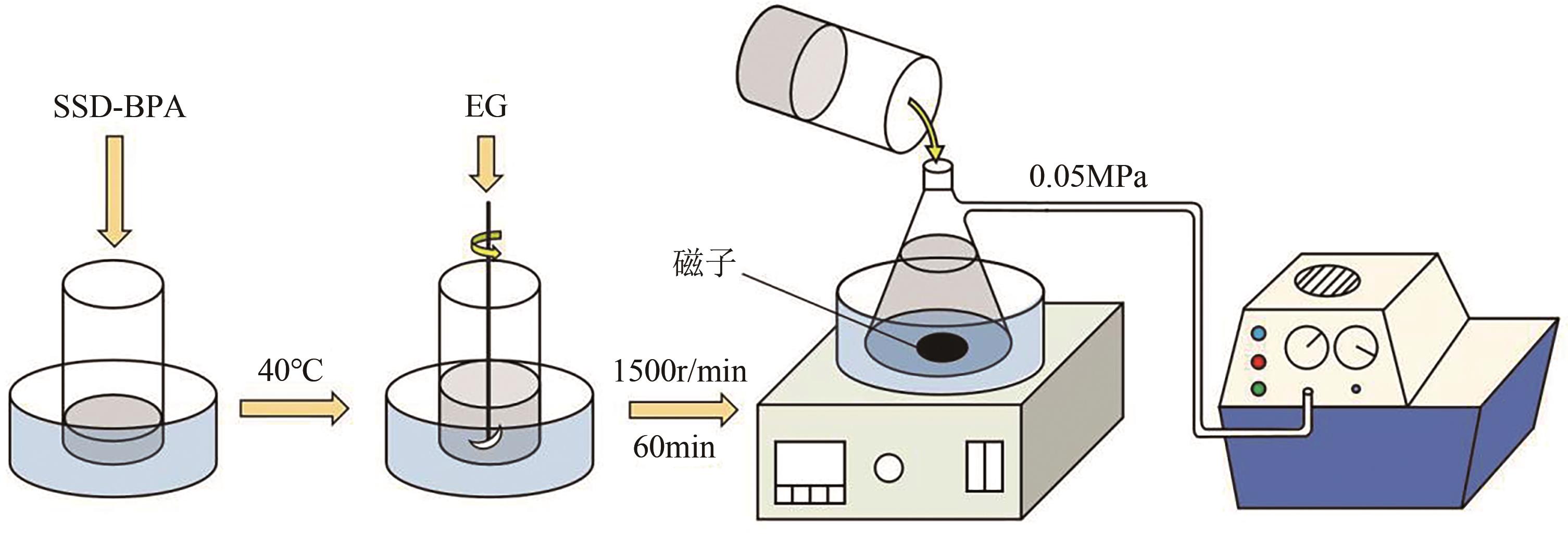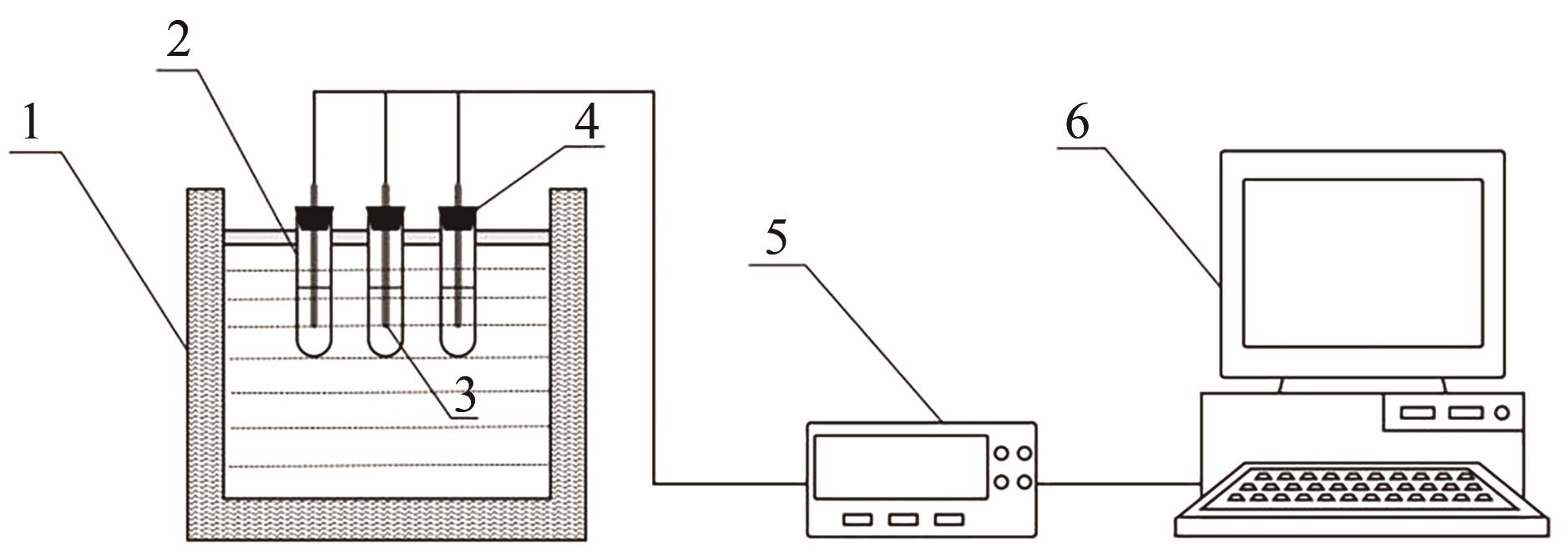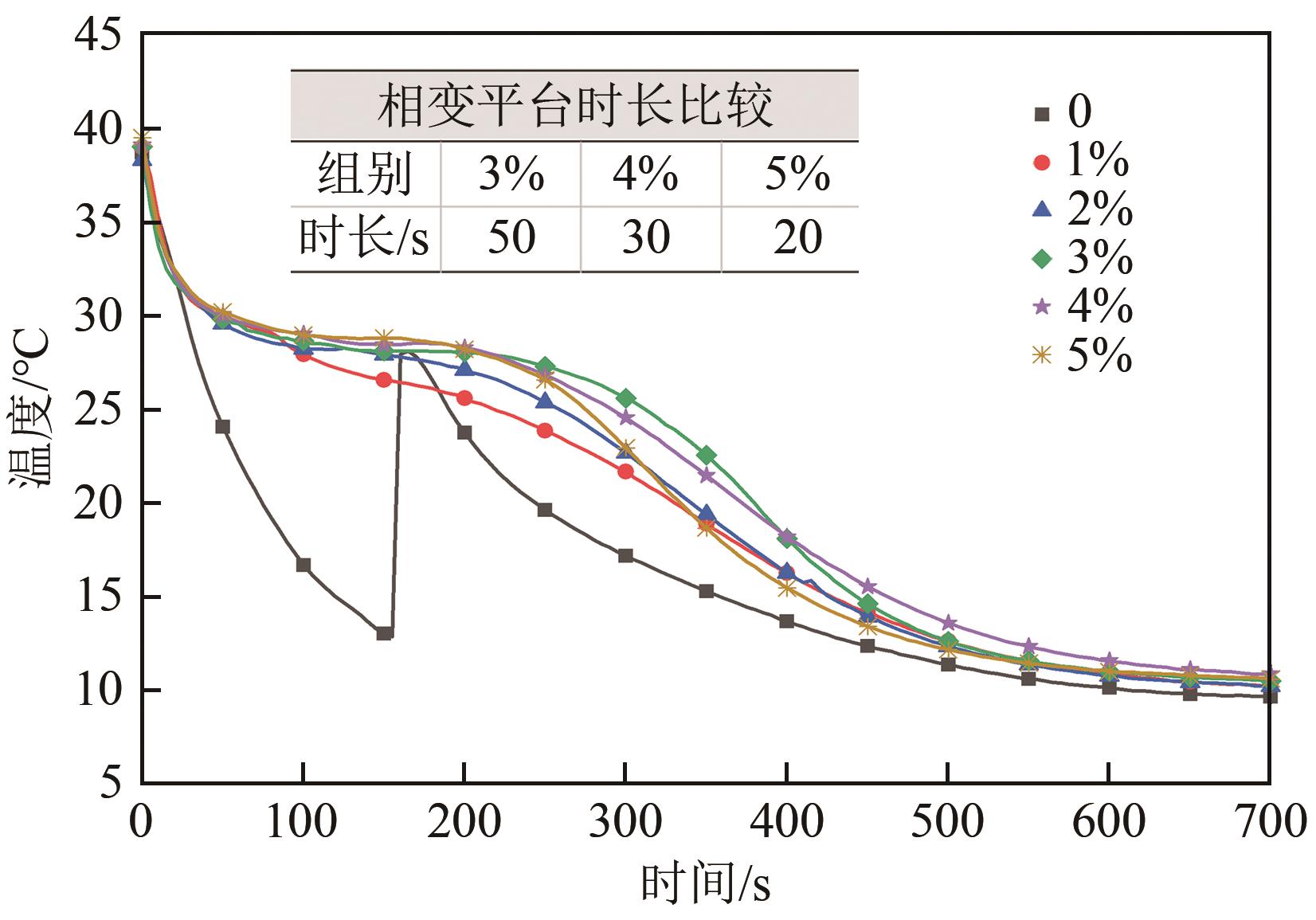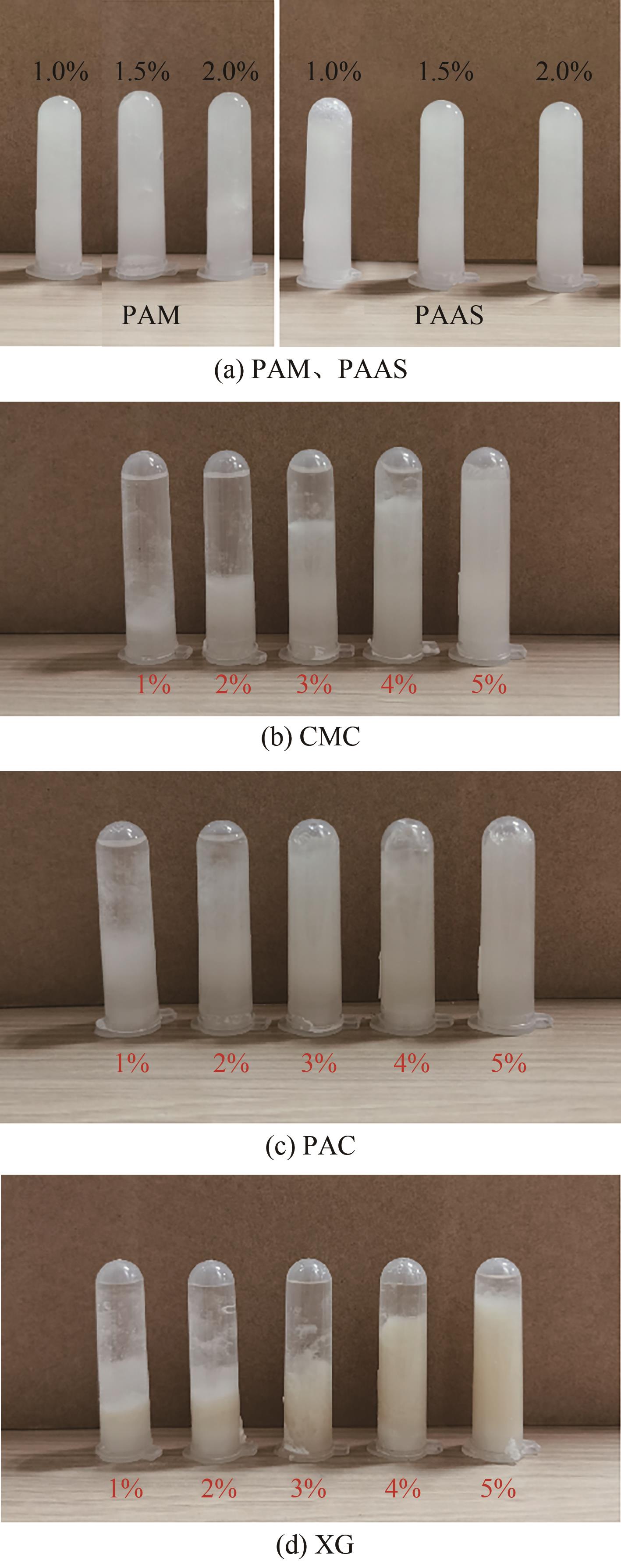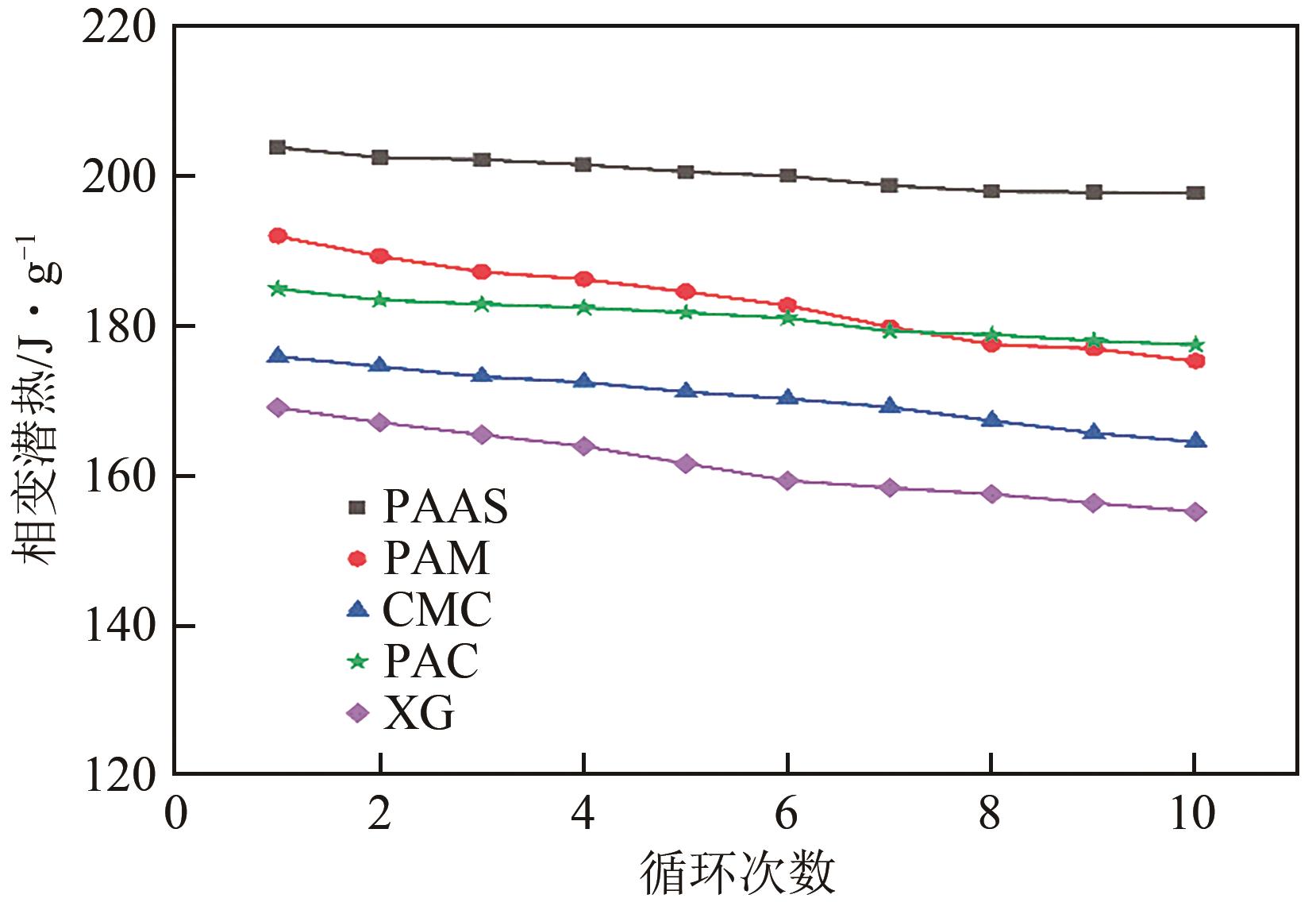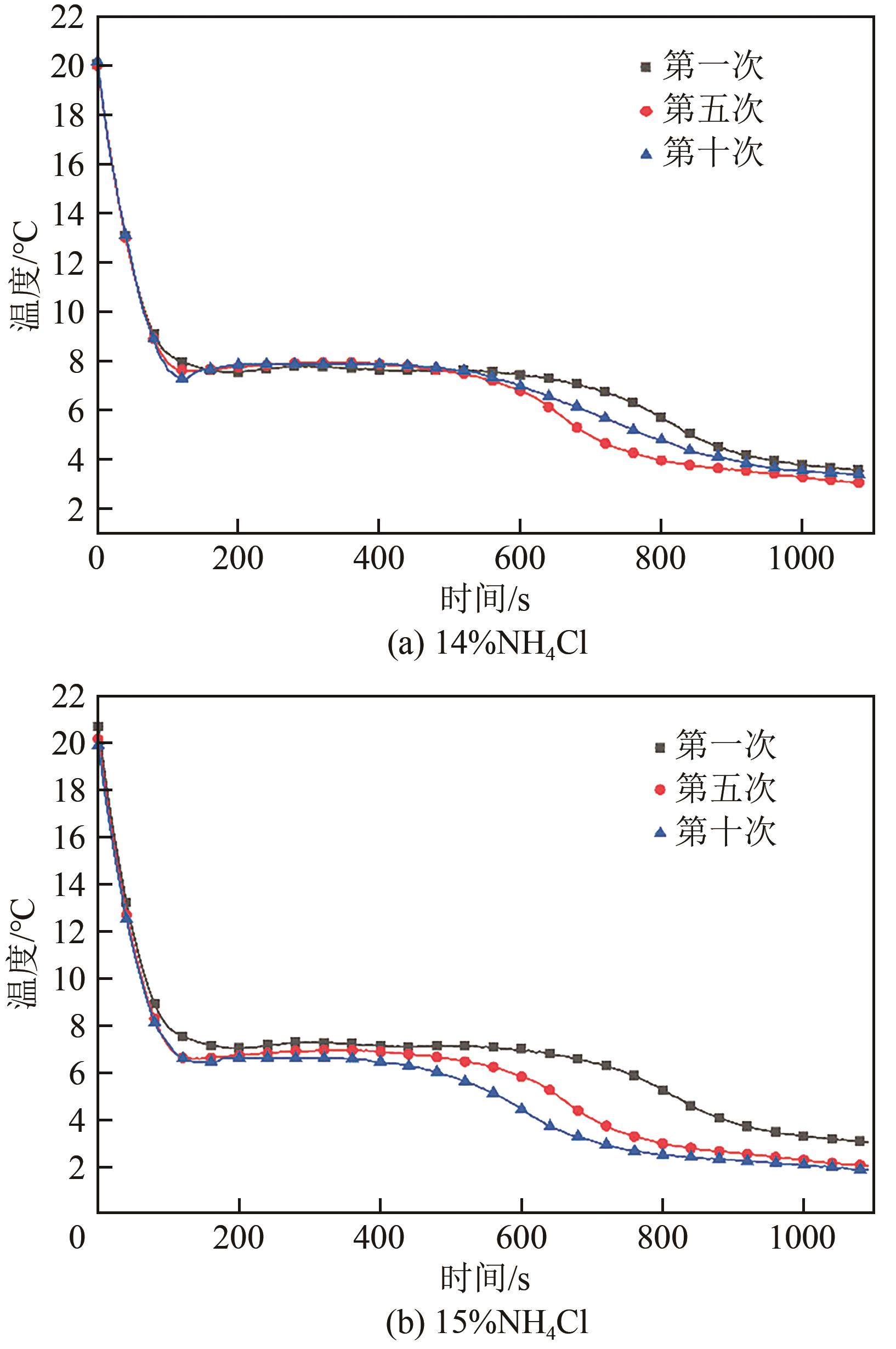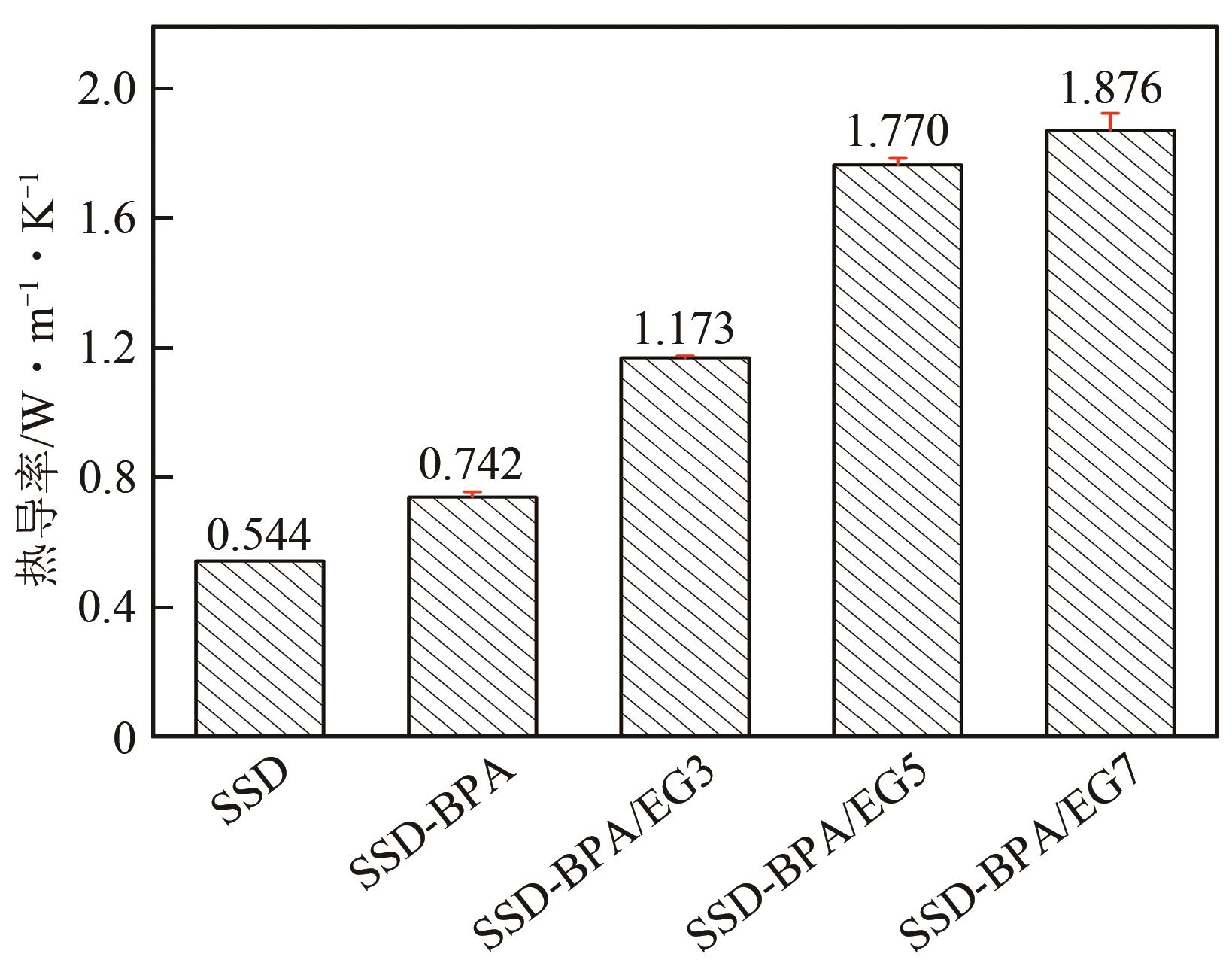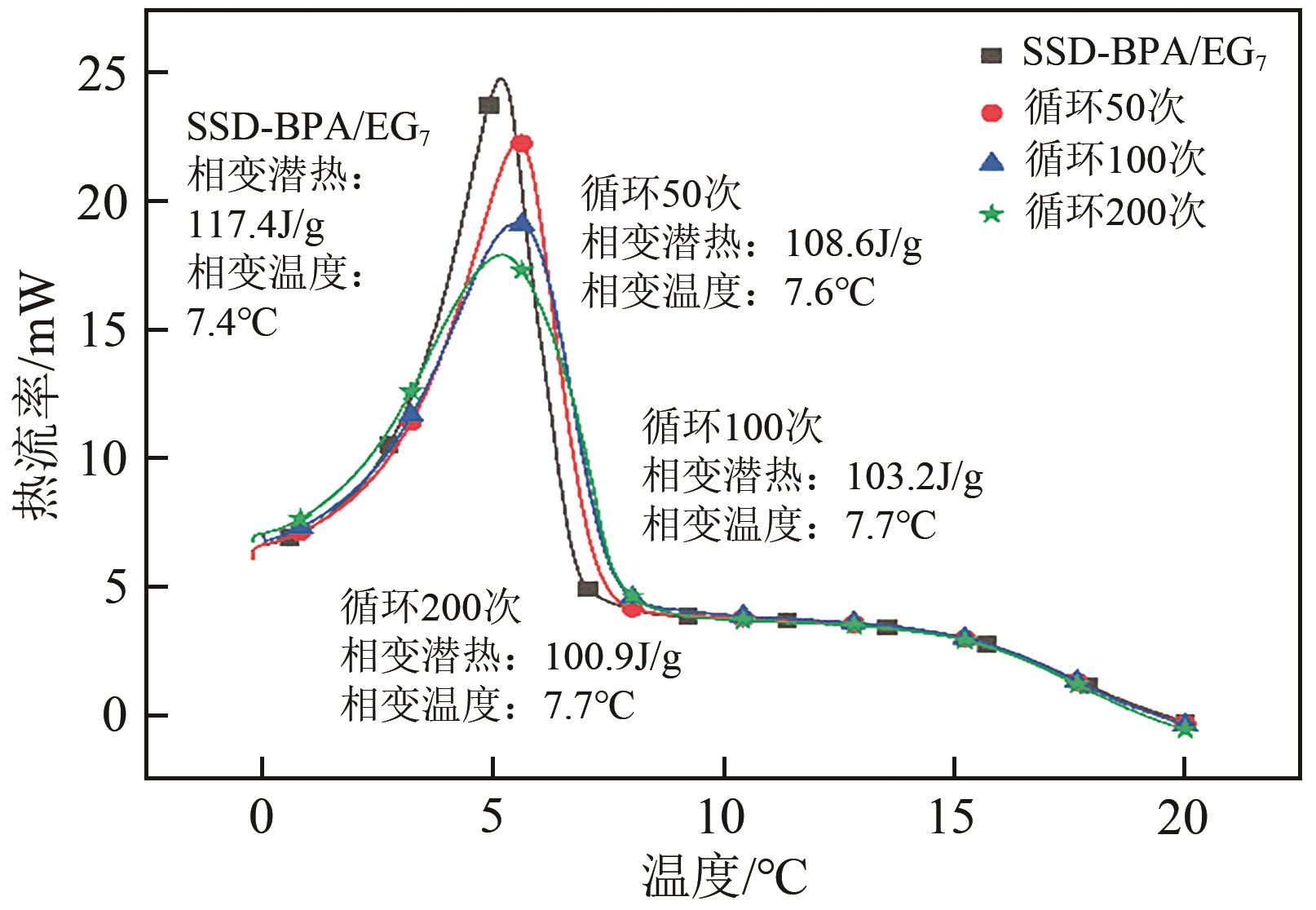Chemical Industry and Engineering Progress ›› 2022, Vol. 41 ›› Issue (11): 5977-5985.DOI: 10.16085/j.issn.1000-6613.2022-0183
• Materials science and technology • Previous Articles Next Articles
Preparation and performance optimization of phase change cold storage materials with sodium sulfate hydrate salt
YANG Jin1( ), YIN Yonggao1(
), YIN Yonggao1( ), CHEN Wanhe1, WANG Jingyuan1, CHEN Jiufa2
), CHEN Wanhe1, WANG Jingyuan1, CHEN Jiufa2
- 1.School of Energy and Environment, Southeast University, Nanjing 210096, Jiangsu, China
2.Nanjing Purple Mountain Smart City Research Institute Co. , Nanjing 210096, Jiangsu, China
-
Received:2022-02-06Revised:2022-04-19Online:2022-11-28Published:2022-11-25 -
Contact:YIN Yonggao
硫酸钠水合盐相变蓄冷材料的制备及性能优化
杨晋1( ), 殷勇高1(
), 殷勇高1( ), 陈万河1, 王静远1, 陈九法2
), 陈万河1, 王静远1, 陈九法2
- 1.东南大学能源与环境学院,江苏 南京 210096
2.南京紫金山智慧城市研究院有限公司,江苏 南京 210096
-
通讯作者:殷勇高 -
作者简介:杨晋(1997—),女,硕士研究生,研究方向为相变蓄冷。E-mail:EUGENIA7_21@163.com。
CLC Number:
Cite this article
YANG Jin, YIN Yonggao, CHEN Wanhe, WANG Jingyuan, CHEN Jiufa. Preparation and performance optimization of phase change cold storage materials with sodium sulfate hydrate salt[J]. Chemical Industry and Engineering Progress, 2022, 41(11): 5977-5985.
杨晋, 殷勇高, 陈万河, 王静远, 陈九法. 硫酸钠水合盐相变蓄冷材料的制备及性能优化[J]. 化工进展, 2022, 41(11): 5977-5985.
share this article
Add to citation manager EndNote|Ris|BibTeX
URL: https://hgjz.cip.com.cn/EN/10.16085/j.issn.1000-6613.2022-0183
| 水合盐 | 相变温度/℃ | 相变潜热/kJ·kg-1 | 价格/CNY·kg-1 |
|---|---|---|---|
| CaCl2·6H2O | 29.6 | 191 | 350 |
| Na2SO4·10H2O | 32.4 | 251 | 40 |
| Zn(NO3)2·6H2O | 36.4 | 130 | 170 |
| Na2HPO4·12H2O | 36.5 | 264 | 60 |
| CH3COONa·3H2O | 58 | 266 | 35 |
| Ba(OH)2·8H2O | 78 | 265 | 50 |
| 水合盐 | 相变温度/℃ | 相变潜热/kJ·kg-1 | 价格/CNY·kg-1 |
|---|---|---|---|
| CaCl2·6H2O | 29.6 | 191 | 350 |
| Na2SO4·10H2O | 32.4 | 251 | 40 |
| Zn(NO3)2·6H2O | 36.4 | 130 | 170 |
| Na2HPO4·12H2O | 36.5 | 264 | 60 |
| CH3COONa·3H2O | 58 | 266 | 35 |
| Ba(OH)2·8H2O | 78 | 265 | 50 |
| 用途 | 材料名称 | 分子式 | 分子量 | 生产厂家 |
|---|---|---|---|---|
| 实验主材 | 十水硫酸钠 | Na2SO4·10H2O | 322 | 上海展云 |
| 成核剂 | 硼砂 | Na2B4O7·10H2O | 381 | 成都科隆 |
| 增稠剂 | 聚丙烯酸钠 | C3H3NaO2 | 94 | 罗恩 |
| 聚丙烯酰胺 | C3H5NO | 71 | 罗恩 | |
| 羧甲基纤维素 | C8H16NaO8 | 263 | 上海麦克林 | |
| 聚阴离子纤维素 | Al2(OH)6Cl | 191.5 | 上海麦克林 | |
| 黄原胶 | C35H49O29 | 933 | 上海麦克林 | |
| 熔点控制剂 | 氯化铵 | NH4Cl | 53.5 | 罗恩 |
| 氯化钾 | KCl | 74.5 | 国药集团 | |
| 高导热基体 | 膨胀石墨 | C | 12 | 阿拉丁 |
| 用途 | 材料名称 | 分子式 | 分子量 | 生产厂家 |
|---|---|---|---|---|
| 实验主材 | 十水硫酸钠 | Na2SO4·10H2O | 322 | 上海展云 |
| 成核剂 | 硼砂 | Na2B4O7·10H2O | 381 | 成都科隆 |
| 增稠剂 | 聚丙烯酸钠 | C3H3NaO2 | 94 | 罗恩 |
| 聚丙烯酰胺 | C3H5NO | 71 | 罗恩 | |
| 羧甲基纤维素 | C8H16NaO8 | 263 | 上海麦克林 | |
| 聚阴离子纤维素 | Al2(OH)6Cl | 191.5 | 上海麦克林 | |
| 黄原胶 | C35H49O29 | 933 | 上海麦克林 | |
| 熔点控制剂 | 氯化铵 | NH4Cl | 53.5 | 罗恩 |
| 氯化钾 | KCl | 74.5 | 国药集团 | |
| 高导热基体 | 膨胀石墨 | C | 12 | 阿拉丁 |
| 仪器名称 | 生产公司 | 型号 | 精度 |
|---|---|---|---|
| 磁力搅拌水浴锅 | 恩谊仪器 | HH-2J | 温度稳定性±0.5℃ |
| 低温恒温槽 | 赛勒仪器 | SLDC-0520 | 温度稳定性±0.01℃ |
| 微量热仪 | 法国Setaram | uDSC7 Evo | 温度精度<0.01℃,热焓精度<0.05% |
| 热导率测试仪 | 西安夏溪电子 | TC3000E | 3% |
| 安捷伦数据采集仪 | Agilent | 34970A | 温度系数0.03℃ |
| 热场发射扫描 电子显微镜 | 美国FEI | quanta 400 FEG | 重复精度: 2μm(X/Y方向) |
| 仪器名称 | 生产公司 | 型号 | 精度 |
|---|---|---|---|
| 磁力搅拌水浴锅 | 恩谊仪器 | HH-2J | 温度稳定性±0.5℃ |
| 低温恒温槽 | 赛勒仪器 | SLDC-0520 | 温度稳定性±0.01℃ |
| 微量热仪 | 法国Setaram | uDSC7 Evo | 温度精度<0.01℃,热焓精度<0.05% |
| 热导率测试仪 | 西安夏溪电子 | TC3000E | 3% |
| 安捷伦数据采集仪 | Agilent | 34970A | 温度系数0.03℃ |
| 热场发射扫描 电子显微镜 | 美国FEI | quanta 400 FEG | 重复精度: 2μm(X/Y方向) |
| 1 | 唐瑞, 桂树强, 颜俊, 等. 相变材料应用于空调蓄冷中的研究进展[J]. 建筑节能, 2020, 48(1): 57-61. |
| TANG Rui, GUI Shuqiang, YAN Jun, et al. Research progress of phase change materials applied in air-conditioning cold storage[J]. Building Energy Efficiency, 2020, 48(1): 57-61. | |
| 2 | 王温馨, 齐红, 丁益民. 水合盐相变储能材料的研究进展[J]. 化学通报, 2021, 84(4): 330-338. |
| WANG Wenxin, QI Hong, DING Yimin. Research progress in hydrated salt composite phase change energy storage materials[J]. Chemistry, 2021, 84(4): 330-338. | |
| 3 | 杨天润, 孙锲, WENNERSTEN Ronald, 等. 相变蓄冷材料的研究进展[J]. 工程热物理学报, 2018, 39(3): 567-573. |
| YANG Tianrun, SUN Qie, WENNERSTEN Ronald, et al. Review of phase change materials for cold thermal energy storage[J]. Journal of Engineering Thermophysics, 2018, 39(3): 567-573. | |
| 4 | ZHAI X Q, WANG X L, WANG T, et al. A review on phase change cold storage in air-conditioning system: materials and applications[J]. Renewable and Sustainable Energy Reviews, 2013, 22: 108-120. |
| 5 | NIE Binjian, PALACIOS Anabel, ZOU Boyang, et al. Review on phase change materials for cold thermal energy storage applications[J]. Renewable and Sustainable Energy Reviews, 2020, 134: 110340. |
| 6 | CHEN Weicheng, LIANG Xianghui, WANG Shuangfeng, et al. SiO2 hydrophilic modification of expanded graphite to fabricate form-stable ternary nitrate composite room temperature phase change material for thermal energy storage[J]. Chemical Engineering Journal, 2021, 413: 127549. |
| 7 | LI Gang, ZHANG Binbin, LI Xiang, et al. The preparation, characterization and modification of a new phase change material: CaCl2·6H2O-MgCl2·6H2O eutectic hydrate salt[J]. Solar Energy Materials and Solar Cells, 2014, 126: 51-55. |
| 8 | EL-BASSUONI Abdel Monem A, TAYEB Aghareed M, HELWA Nawal H, et al. Modification of urea-sodium acetate trihydrate mixture for solar energy storage[J]. Renewable Energy, 2003, 28(10): 1629-1643. |
| 9 | 张寅平. 相变贮能: 理论和应用[M]. 合肥: 中国科学技术大学出版社, 1996. |
| ZHANG Yinping. Phase change energy storage: theory and applications[M]. Hefei: University of Science and Technology of China Press, 1996. | |
| 10 | 喻彩梅, 章学来, 华维三. 十水硫酸钠相变储能材料研究进展[J]. 储能科学与技术, 2021, 10(3): 1016-1024. |
| YU Caimei, ZHANG Xuelai, HUA Weisan. Research progress of sodium sulfate decahydrate phase change material[J]. Energy Storage Science and Technology, 2021, 10(3): 1016-1024. | |
| 11 | 刘剑虹, 刘瑞虹, 王超会, 等. Na2SO4·10H2O复合相变储能体系的热力学测试[J]. 节能, 2007, 26(9): 13-14, 24. |
| LIU Jianhong, LIU Ruihong, WANG Chaohui, et al. Thermodynamics test of Na2SO4·10H2O phase change compound system[J]. Energy Conservation, 2007, 26(9): 13-14, 24. | |
| 12 | 谢奕, 史波, 冯叶. 空调用共晶盐蓄冷材料的增稠特性实验研究[J]. 建筑节能, 2020, 48(4): 9-13, 32. |
| XIE Yi, SHI Bo, FENG Ye. Experimental study on thickening characteristics of eutectic salt cold storage material for air conditioning[J]. Building Energy Efficiency, 2020, 48(4): 9-13, 32. | |
| 13 | ZHU Na, HU Pingfang, LEI Yu, et al. Numerical study on ground source heat pump integrated with phase change material cooling storage system in office building[J]. Applied Thermal Engineering, 2015, 87: 615-623. |
| 14 | 张志同, 王瑾, 柳建华, 等. Na2SO4·10H2O相变蓄冷材料的研究进展[J]. 建筑节能, 2016, 44(8): 55-59. |
| ZHANG Zhitong, WANG Jin, LIU Jianhua, et al. Research progress of Na2SO4·10H2O phase change cooling storage materials[J]. Building Energy Efficiency, 2016, 44(8): 55-59. | |
| 15 | TELKES Maria. Nucleation of supersaturated inorganic salt solutions[J]. Industrial & Engineering Chemistry, 1952, 44(6): 1308-1310. |
| 16 | VAVOURAKI A I, KOUTSOUKOS P G. Kinetics of crystal growth of mirabilite in aqueous supersaturated solutions[J]. Journal of Crystal Growth, 2012, 338(1): 189-194. |
| 17 | 李玉婷, 周永全, 葛飞, 等. 无机水合盐相变储能材料的过冷及相分离研究进展[J]. 盐湖研究, 2018, 26(1): 81-86. |
| LI Yuting, ZHOU Yongquan, GE Fei, et al. Supercooling and phase separation of inorganic salt hydrates as phase change materials[J]. Journal of Salt Lake Research, 2018, 26(1): 81-86. | |
| 18 | LI Chuanchang, ZHANG Bo, XIE Baoshan, et al. Tailored phase change behavior of Na2SO4·10H2O/expanded graphite composite for thermal energy storage[J]. Energy Conversion and Management, 2020, 208: 112586. |
| 19 | 刘欣, 徐涛, 高学农, 等. 十水硫酸钠的过冷和相分离探究[J]. 化工进展, 2011, 30(S1): 755-758. |
| LIU Xin, XU Tao, GAO Xuenong, et al. Study on supercooling and phase separation of Na2SO4·10H2O[J]. Chemical Industry and Engineering Progress, 2011, 30(S1): 755-758. | |
| 20 | 郑涛杰, 陈志莉, 刘强, 等. 水合盐相变储能材料的增稠剂优选研究[J]. 太阳能学报, 2018, 39(7): 1781-1787. |
| ZHENG Taojie, CHEN Zhili, LIU Qiang, et al. Study on optimum agent of thickener for salt hydrate phase change energy storage material[J]. Acta Energiae Solaris Sinica, 2018, 39(7): 1781-1787. | |
| 21 | Håkon SELVNES, ALLOUCHE Yosr, MANESCU Raluca Iolanda, et al. Review on cold thermal energy storage applied to refrigeration systems using phase change materials[J]. Thermal Science and Engineering Progress, 2021, 22: 100807. |
| 22 | LI Yaxi, LI Chuanchang, LIN Niangzhi, et al. Review on tailored phase change behavior of hydrated salt as phase change materials for energy storage[J]. Materials Today Energy, 2021, 22: 100866. |
| 23 | 李文琛, 蔡一凡, 严泰森, 等. 三水合醋酸钠/膨胀石墨复合相变材料的制备及其储热性能[J]. 上海交通大学学报, 2020, 54(10): 1015-1023. |
| LI Wenchen, CAI Yifan, YAN Taisen, et al. Preparation and thermal storage properties of sodium acetate trihydrate-expanded graphite as phase change composite[J]. Journal of Shanghai Jiao Tong University, 2020, 54(10): 1015-1023. | |
| 24 | 王佩祥, 冯秀娟, 朱易春, 等. 利用膨胀石墨改进十二水磷酸氢二钠复合相变材料的蓄热性能[J]. 材料导报, 2020, 34(18): 18044-18048. |
| WANG Peixiang, FENG Xiujuan, ZHU Yichun, et al. Improvement of heat storage performance of disodium hydrogen phosphate dodecahydrate composite phase change materials with expanded graphite[J]. Materials Reports, 2020, 34(18): 18044-18048. |
| [1] | TANG Lei, ZENG Desen, LING Ziye, ZHANG Zhengguo, FANG Xiaoming. Research progress of phase change materials and their application systems for cool storage [J]. Chemical Industry and Engineering Progress, 2023, 42(8): 4322-4339. |
| [2] | YANG Yang, SUN Zhigao, LI Cuimin, LI Juan, HUANG Haifeng. Promotion on the formation of HCFC-141b hydrate under static conditions by surfactant OP-13 [J]. Chemical Industry and Engineering Progress, 2023, 42(6): 2854-2859. |
| [3] | WU Weixiong, XIE Shiwei, MA Ruixin, LIU Jizhen, WANG Shuangfeng, RAO Zhonghao. Research progress of solid-liquid/gas-liquid multiphase coupling thermal control technology [J]. Chemical Industry and Engineering Progress, 2023, 42(3): 1143-1154. |
| [4] | HAO Xubo, NIU Baolian, GUO Haotian, XU Xianghe, ZHANG Zhongbin, LI Yinglin. Modification of microencapsulated phase change material and its utilization in photothermal conversion [J]. Chemical Industry and Engineering Progress, 2023, 42(2): 854-871. |
| [5] | BAI Jingang, YUAN Zhengji, LIU Yu, ZHANG Yishi, LYU Xifeng. Fabrication and thermal properties of decanoic acid-paraffin/graphene aerogel form-stable phase change materials [J]. Chemical Industry and Engineering Progress, 2022, 41(8): 4441-4448. |
| [6] | ZHU Mengshuai, WANG Zilong, SUN Xiangxin, ZHOU Xiang. Experimental research on effect of copper metal foam proportion on paraffin wax melting and heat transfer mechanism under high cell density [J]. Chemical Industry and Engineering Progress, 2022, 41(6): 3203-3211. |
| [7] | ZHANG Ruirui, WANG Ning, GAO Zhi, YU Xiaohui, YANG Bin. Analysis of supercooling characteristics of erythritol/mannitol [J]. Chemical Industry and Engineering Progress, 2022, 41(6): 2959-2966. |
| [8] | ZHANG Wenjie, WU Wei, LI Songze, ZHANG Zijian, YI Xuemei. Preparation and properties of Na2SO4 ·10H2O-Na2HPO4·12H2O composite shaped phase change material for greenhouse [J]. Chemical Industry and Engineering Progress, 2022, 41(2): 920-929. |
| [9] | ZHOU Taotao, XIONG Zhibo, WU Zhigen, LI Shang. Characters of electric resistance and heating of expanded graphite/paraffin composite phase change materials [J]. Chemical Industry and Engineering Progress, 2022, 41(2): 892-900. |
| [10] | YU Xinghai, TANG Haiwei, LI Yan’an, HAN Yuqi, MIN Xuemei. Electro- and photo-driven phase change composites based on stearic acid-infiltrated biochar [J]. Chemical Industry and Engineering Progress, 2022, 41(11): 5936-5945. |
| [11] | NI Jinpeng, LUO Zhuqing, QU Zhiguo, XU Hongtao. Numerical analysis on heat transfer performance of phase change roofs under different climates [J]. Chemical Industry and Engineering Progress, 2022, 41(1): 104-112. |
| [12] | LIU Chang, CHEN Yanjun, ZHANG Chaocan. Low temperature phase change materials for subzero applications [J]. Chemical Industry and Engineering Progress, 2022, 41(1): 286-299. |
| [13] | ZHANG Runxia, GU Zhaolin, WANG Zanshe, KANG Yanqing, BAI Mengmeng. Preparation and characterization of phase change materials for air energy storage [J]. Chemical Industry and Engineering Progress, 2021, 40(7): 3892-3899. |
| [14] | Qian XUE, Xiaolin WANG, Zunzhao LI, Mingrui LIU, Wei ZHAO. Research progresses in hydrate based technologies and processes [J]. Chemical Industry and Engineering Progress, 2021, 40(2): 722-735. |
| [15] | Zhong XU, Jing HOU, Jun LI, Enhui WU, Ping HUANG, Qianshu LIU, Dawei XU. Preparation and performances of expanded graphite/organic matter composite phase change materials [J]. Chemical Industry and Engineering Progress, 2020, 39(7): 2758-2767. |
| Viewed | ||||||
|
Full text |
|
|||||
|
Abstract |
|
|||||
